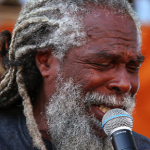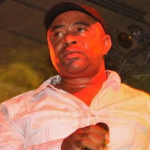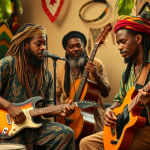Tony Rebel
The Life and Legacy of Tony Rebel
Introduction Tony Rebel, born Patrick George Anthony Barrett on January 15, 1962, in Manchester Parish, Jamaica, is a luminary in the realm of reggae music. Known for his distinct singjay style, Tony Rebel has carved out a significant place in the reggae and dancehall scenes. His career, marked by cultural consciousness and musical innovation, has made him a staple in the world of reggae. This biography delves into his life. It examines his journey from local talent contests to international acclaim. Moreover, it explores his impact on Jamaican culture through his music and the famed Rebel Salute festival.
Early Life and Career Beginnings
Tony Rebel’s musical journey began in the vibrant community of Manchester Parish. Initially performing as Papa Tony or Tony Ranking, he honed his skills in local talent contests and on sound systems. These included the renowned Sugar Minott’s “Youth Promotion.” These formative experiences laid the groundwork for his future success. They helped him develop a unique musical style that blends traditional reggae with modern influences.
Breakthrough and Rise to Fame
In 1988, Tony Rebel released his first single, “Casino,” under the MGB record label. However, it was his collaboration with Donovan Germain’s Penthouse Records in the early 1990s that truly propelled his career. His 1990 hit “Fresh Vegetable” showcased his singjay delivery. It established him as a notable figure in the reggae scene. Tony Rebel’s music stood out for its cultural depth and his commitment to Rastafarian values, a rarity among the ragga deejays of the time.
Major Milestones
Vibes of the Times
In 1992, Tony Rebel signed with Columbia Records, marking a significant milestone in his career. His album “Vibes of the Times,” released the following year, was a reggae fusion masterpiece. It included international hits like the title track and “Nazerite Vow.” These songs, accompanied by music videos, expanded his reach. They solidified his place on the global stage.
Establishment of Flames Records
In 1994, Tony Rebel founded his own record label, Flames. This venture allowed him to nurture local talent and produce music that stayed true to his cultural and musical roots. Flames Records became a platform for promoting reggae music that was conscious and lyrically rich.
Contributions to Reggae and Culture
Rebel Salute Festival
Tony Rebel’s contributions extend beyond music production. In 1994, he founded the Rebel Salute festival, held annually on January 15, his birthday. Originally hosted in Manchester Parish and later moved to the Richmond Park Estate in Saint Ann Parish, Rebel Salute is one of Jamaica’s biggest music festivals. The event celebrates roots reggae, culturally themed dancehall, and Jamaican heritage. It features local and international artists, and its family-friendly atmosphere promotes healthy living and cultural awareness.
Advocacy and Philanthropy
In 2001, Tony Rebel demonstrated his commitment to global causes by writing and donating the song “Not All About Money” to the United Nations Volunteers program. This song was chosen as the lead for the International Year of Volunteers 2001 CD. It highlights his dedication to using music as a tool for social change.
Legacy and Influence
Tony Rebel’s influence on reggae music and Jamaican culture is profound. Through his music, he has promoted messages of unity, peace, and cultural pride. His work with Rebel Salute has not only preserved but also rejuvenated interest in roots reggae and conscious music. The festival’s “Rising Star” segment supports emerging artists, ensuring the longevity and evolution of reggae music.
Conclusion
Tony Rebel’s journey from a local singer in Manchester Parish to an international reggae icon is a testament to his talent, determination, and cultural commitment. His legacy is reflected in his music, his record label, and the enduring success of Rebel Salute. Tony Rebel continues to inspire new generations of artists and fans. He reinforces the timeless appeal and cultural significance of reggae music. His life and work remain a beacon of creativity and cultural pride in Jamaica and beyond.












